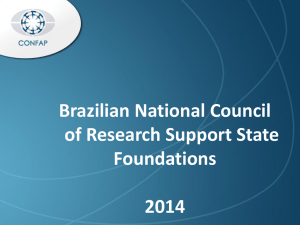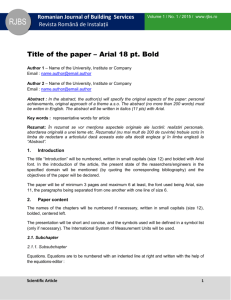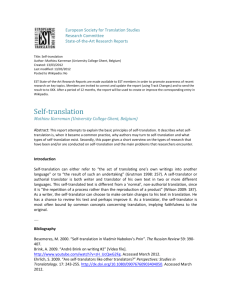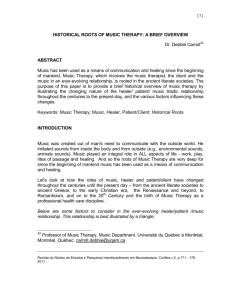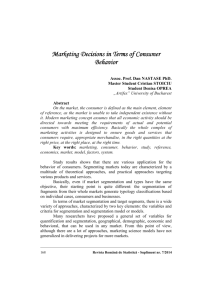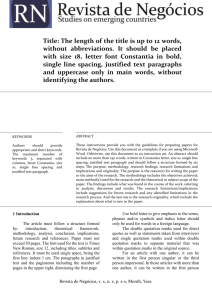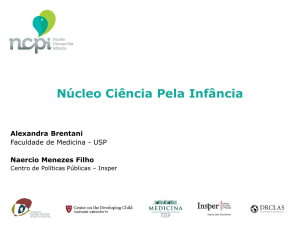ARTFINAL 7 Education_through_English_language_teaching
advertisement
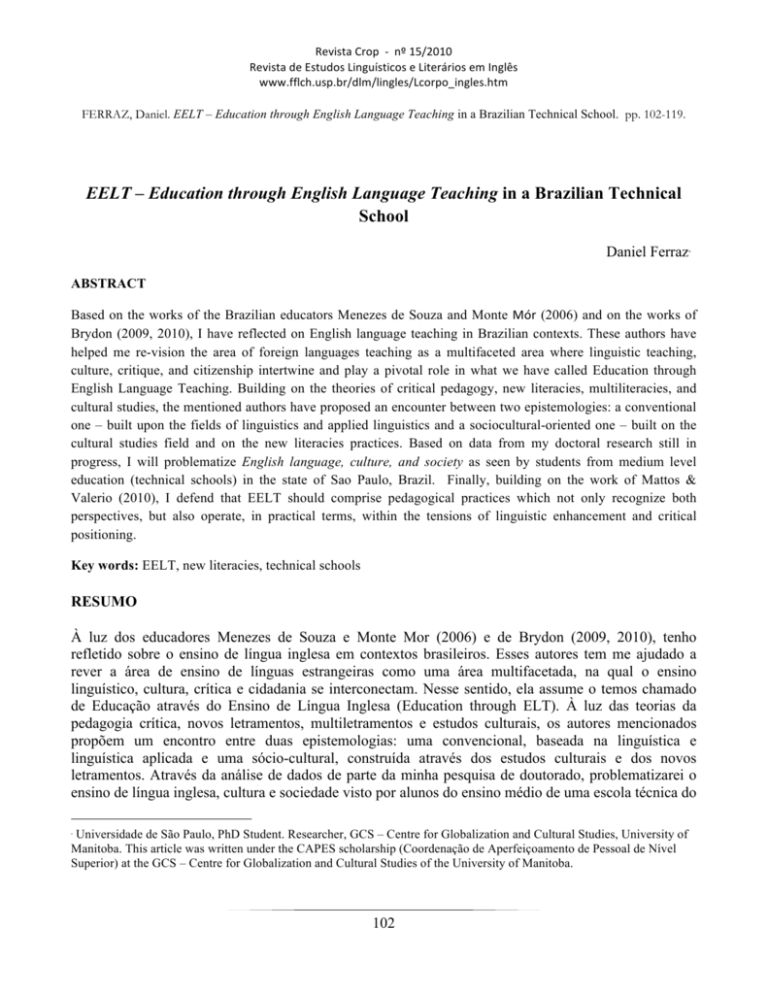
Revista Crop -­‐ nº 15/2010 Revista de Estudos Linguísticos e Literários em Inglês www.fflch.usp.br/dlm/lingles/Lcorpo_ingles.htm FERRAZ, Daniel. EELT – Education through English Language Teaching in a Brazilian Technical School. pp. 102-119. EELT – Education through English Language Teaching in a Brazilian Technical School Daniel Ferraz ∗ ABSTRACT Based on the works of the Brazilian educators Menezes de Souza and Monte Mór (2006) and on the works of Brydon (2009, 2010), I have reflected on English language teaching in Brazilian contexts. These authors have helped me re-vision the area of foreign languages teaching as a multifaceted area where linguistic teaching, culture, critique, and citizenship intertwine and play a pivotal role in what we have called Education through English Language Teaching. Building on the theories of critical pedagogy, new literacies, multiliteracies, and cultural studies, the mentioned authors have proposed an encounter between two epistemologies: a conventional one – built upon the fields of linguistics and applied linguistics and a sociocultural-oriented one – built on the cultural studies field and on the new literacies practices. Based on data from my doctoral research still in progress, I will problematize English language, culture, and society as seen by students from medium level education (technical schools) in the state of Sao Paulo, Brazil. Finally, building on the work of Mattos & Valerio (2010), I defend that EELT should comprise pedagogical practices which not only recognize both perspectives, but also operate, in practical terms, within the tensions of linguistic enhancement and critical positioning. Key words: EELT, new literacies, technical schools RESUMO À luz dos educadores Menezes de Souza e Monte Mor (2006) e de Brydon (2009, 2010), tenho refletido sobre o ensino de língua inglesa em contextos brasileiros. Esses autores tem me ajudado a rever a área de ensino de línguas estrangeiras como uma área multifacetada, na qual o ensino linguístico, cultura, crítica e cidadania se interconectam. Nesse sentido, ela assume o temos chamado de Educação através do Ensino de Língua Inglesa (Education through ELT). À luz das teorias da pedagogia crítica, novos letramentos, multiletramentos e estudos culturais, os autores mencionados propõem um encontro entre duas epistemologias: uma convencional, baseada na linguística e linguística aplicada e uma sócio-cultural, construída através dos estudos culturais e dos novos letramentos. Através da análise de dados de parte da minha pesquisa de doutorado, problematizarei o ensino de língua inglesa, cultura e sociedade visto por alunos do ensino médio de uma escola técnica do Universidade de São Paulo, PhD Student. Researcher, GCS – Centre for Globalization and Cultural Studies, University of Manitoba. This article was written under the CAPES scholarship (Coordenação de Aperfeiçoamento de Pessoal de Nível Superior) at the GCS – Centre for Globalization and Cultural Studies of the University of Manitoba. ∗ 102 Revista Crop -­‐ nº 15/2010 Revista de Estudos Linguísticos e Literários em Inglês www.fflch.usp.br/dlm/lingles/Lcorpo_ingles.htm FERRAZ, Daniel. EELT – Education through English Language Teaching in a Brazilian Technical School. pp. 102-119. estado de São Paulo. Finalmente, corroborando com Mattos & Valerio (2010), defendo que EELT deve não somente incluir ambas as perspectivas, mas também operar nas tensões (ensino linguístico x posicionamentos críticos) por ele propostas. Palavras-chave: EELT, novos letramentos, escola técnica. Introduction: Education, language teaching, culture and society. To learn another language is to enter a space of vulnerability, of listening and giving ever so gradually, of succumbing with time to what can be a radically different worldview. MacPherson, Teaching English in the Global Era (in: Curriculum as Cultural Practice) I have reflected and researched on English language teaching in Brazilian contexts since my undergrad studies. I have sought to reshape my own pedagogical practices as well as learned to revision the area of foreign languages teaching as a multifaceted area where linguistic teaching, culture, critique, and citizenship intertwine and play a pivotal role in what we have called Education through English Language Teaching (EELT). Nevertheless there has been a plethora of acronyms (TESL / TESOL/ TEFL/ TEAL/ TEIL/ TESP/ TEML/ TEIM) to conceptualize the many contexts in which English language education has taken place around the globe (MacPherson 2006) I am assuming that EELT reflects a rather different concept from these previous ones provided it accounts for the intertwining of contemporary takes on education and English language teaching. EELT connects its theoretical assumptions to post-movements (post-structuralism, postcolonial studies, and critical theory) as well as it tries to discuss citizenship and democracy through language learning. Menezes de Souza and Monte Mór (2006), building on the theories of critical pedagogy, new literacies, and 103 Revista Crop -­‐ nº 15/2010 Revista de Estudos Linguísticos e Literários em Inglês www.fflch.usp.br/dlm/lingles/Lcorpo_ingles.htm FERRAZ, Daniel. EELT – Education through English Language Teaching in a Brazilian Technical School. pp. 102-119. multiliteracies have proposed - in the Brazilian National Curricula Orientations for medium level education (OCEM 2006)- pedagogical practices for foreign languages teaching which foster the encounter between two epistemologies: a conventional one which is built upon the fields of linguistics and applied linguistics and a sociocultural-oriented one which is built on the new literacies and multiliteracies theories. In the article “Foreign languages teaching, education and the new literacies studies: expanding views”, Monte Mór (2009) acknowledges that: Noticeably, thus, the proposal here focused (foreign language education) shows pedagogical-philosophical concerns, as it turns to a critical perception of the societies in which we all live, to the development of people who interact in these societies having more capacity of choices and decision making. Therefore, it is possible to conclude, first of all, that the teaching of foreign languages that integrate elementary, secondary and university education should not be seen as merely instrumental, they must be seen as part of a larger educational commitment, if it is assumed that foreign language studies may contribute to education (p.9) This paper also expands the realm of English language teaching for it problematizes the relations between language and culture as well as English language and society. In this sense, the contributions of Brydon (2008, 2010) to this reflection are tantamount provided they widen perspectives and interconnections in the area of global/local studies, education and culture. By raising questions such as (1) the interrelations of culture and language from the perspective of cultural studies, and (2) languages as constructing, determining, and questioning global imaginaries, the author has contributed to an interdisciplinary and expanded view of English language teaching. Many of the preoccupations of critical education movements (critical pedagogy, critical literacy, and new literacies) 104 Revista Crop -­‐ nº 15/2010 Revista de Estudos Linguísticos e Literários em Inglês www.fflch.usp.br/dlm/lingles/Lcorpo_ingles.htm FERRAZ, Daniel. EELT – Education through English Language Teaching in a Brazilian Technical School. pp. 102-119. have resonance in the areas of globalization and cultural studies. Some examples might be drawn from Charles Taylor’s Modern Social Imaginaries, Appadurai’s Modernity at Large, and Brydon & Coleman’s Renegotiating Communities: Interdisciplinary perspectives, global contexts. These three books have outlined complex understandings of key terms such as globalization, culture, democracy, and citizenship. These terms have encapsulated social imaginaries that should to be problematized in the field of education. In the words of Brydon (2010), The concept of an imaginary, employed as a noun rather than an adjective, is not well known beyond the academy. Within literary and cultural studies, psychoanalytical theory, and sociological theory, however, it is becoming widely used to describe a socially constructivist view of how persons and communities arrange and understand themselves through values, laws, symbols, and institutions. Whereas imaginary as an adjective usually describes something having existence only in the imagination, imaginary as a noun refers to the ways in which the imagination may give rise to social and political arrangements in the material world (p.1). Appadurai (2008) joins the debate by stating that the imaginary can become “fuel for action”: “the image, the imagined, the imagination, these are all terms that direct us to something critical and new in global cultural processes: the imagination as a social practice” (Appadurai 2008: 31). Thus, by tackling how students view some key social imaginaries through English lessons, this paper investigates if English language teaching has contributed to students’ educational processes. Based on data from my doctoral research still in progress, I will problematize English language, culture, and society as seen by students from medium level education (technical schools) in the state of Sao Paulo, Brazil. Finally, building on the work of Mattos & Valerio (2010), I defend that EELT should comprise 105 Revista Crop -­‐ nº 15/2010 Revista de Estudos Linguísticos e Literários em Inglês www.fflch.usp.br/dlm/lingles/Lcorpo_ingles.htm FERRAZ, Daniel. EELT – Education through English Language Teaching in a Brazilian Technical School. pp. 102-119. pedagogical practices which not only recognize both perspectives, but also operate, in practical terms, within the tensions of linguistic enhancement and critique positionings. Furthermore, I also suggest that postcolonial intercultural curricula as defended by MacPherson (2006) and Kanu (2006) are essential to build/reshape English language teaching curricula. Methodology I will draw on some brief explanations about the research and methodology. My doctoral research investigates three educational levels, namely: technical education (public high schools), higher level technological education, and a post-graduation course in English teaching. We have researched one school of each level; all of them in the state of Sao Paulo, Brazil. The research aims at investigating how students (and teacher-students in the case of post-grad.) view/ perceive/ debate/ critique the relations between English language learning and their educational formation; English and society, official English language learning (public schools) and non-formal contexts of English learning (private language institutes and other sites for learning such as “internet houses”, cell phones, video game houses, and so on). The data collection was divided into three phases where each phase was designed to investigate different themes as well as to apply different methodological tools. The phases are explained, as follow: 1. A brief explanation and a conversation with the students about the research, and the answering of a questionnaire about students’ profiles. In this questionnaire, we were also interested in investigating: how they learned English, if they studied in a non-formal educational context, if they learned English through other ways rather than in school; 106 Revista Crop -­‐ nº 15/2010 Revista de Estudos Linguísticos e Literários em Inglês www.fflch.usp.br/dlm/lingles/Lcorpo_ingles.htm FERRAZ, Daniel. EELT – Education through English Language Teaching in a Brazilian Technical School. pp. 102-119. 2. Discussion and recording of some themes. In the second phase students were supposed to discuss some topics proposed by this researcher and then record their comments in digital cameras or cellular phones. The themes were: English language and society, English learning and technical education, technical education and society, technology and teaching/learning processes. The students formed their own groups and the researcher handed digital cameras for each group. After discussing and choosing the themes they wanted to talk about, each group recorded their videos. Both phases 1 and 2 above happened on the same day (during students’ English class). 3. The last phase consisted of a discussion in a blog designed for the research. After two weeks of the recordings, students’ videos were posted on a blog (http://etecfatec.blogspot.com). Through email students were invited to comment on their classmates’ comments on the blog. Nevertheless it is not the intention of this paper to discuss each phase of the research, one of our objectives was to put into practice the multimodal and the digital ethnographies as an attempt to connect theories of new literacies to daily pedagogical practices. For this paper, I will discuss the students’ answers of the written questionnaires (phase 1) of two groups (45 students of dance and administration) in a technical school called ETEc (Technical School of the State of Sao Paulo). For the purposes of this article, from the 45 questionnaires I will focus on 6 excerpts from 6 questionnaires. I believe they significantly represent the lines of interpretation I have developed for this article. Theoretical framework and pedagogical practices: reflecting upon education and English language teaching 107 Revista Crop -­‐ nº 15/2010 Revista de Estudos Linguísticos e Literários em Inglês www.fflch.usp.br/dlm/lingles/Lcorpo_ingles.htm FERRAZ, Daniel. EELT – Education through English Language Teaching in a Brazilian Technical School. pp. 102-119. This paper interconnects three assumptions, three epigraphs and three epistemological constructs. By intertwining these three blocks of thinking, I defend that, on the institutional level (policy making and implementation) there is a need to reconceptualise foreign language teaching (English language teaching, more specifically) in Brazilian medium level education. However, on the praxis level (teachers’ pedagogical practices and students’ learning processes), I point out that many of the contemporary educational movements have been incorporated. This indicates that the mentioned praxis has challenged conventional curricular policies and tried to implement new practices. Based on the premises of Cultural Studies (Brydon 2010), on the new curricular proposals (Menezes & Monte Mór 2006), and on postcolonial intercultural curricular proposal (MacPherson 2006, Kanu 2006), I also argue that there is a need to re-vision the categorized curriculum which separates disciplines and contents into fixed and enclosed fields of knowledge. For its leaky borders, Cultural Studies would be an example of such inter-pluridisciplinarity provided that it encompasses an epistemological diversity (Santos 2007) so to speak a vast array of knowledges and fields. MacPherson (2006) joins the debate by proposing a postcolonial curriculum where intercultural education advocates for multilingual, multiliterate and intercultural curricula. The author goes on to argue that this curriculum should be designed “with students willing and able to participate in forums for debating educational, linguistic and cultural change” (MacPherson 2006; 89). The three assumptions I take on this paper are: 1. Education aims at constructing a better world. 2. Critical movements of education contribute to this betterment of the world provided they aim at citizenship and democracy. 108 Revista Crop -­‐ nº 15/2010 Revista de Estudos Linguísticos e Literários em Inglês www.fflch.usp.br/dlm/lingles/Lcorpo_ingles.htm FERRAZ, Daniel. EELT – Education through English Language Teaching in a Brazilian Technical School. pp. 102-119. 3. Education and English language teaching should not be separate fields of knowledge provided they ought to be intrinsically connected if we are to build citizenship, democracy and a better world. Sharon Todd (2000), in the introduction of her book “Towards an Imperfect Education” states that For it is because of our imperfection that we seem to need the civilizing force that education appears to offer. To be taught virtuous habits of mind, to develop our capacity for concern for others, to learn how to become subjects that can make the world a better place to live in, are all commonsensical renderings of what education can do for us. Education tenders the hope that we can be rescued from the bed of destruction (Todd 2000: 8) We educate to make the world a better place to live in. I argue in this paper that education has to aim at building a better world; even if this concept “better” is interpreted in differently within different contexts and by different educators. Nevertheless I am aware of the romanticized view that Todd’s imperfect education might seem at a first glance, I defend that the author’s claim for imperfection rather than perfection is a highly critical one for it eschews the universal claims and positions education in a more destabilized imperfect category. In this epigraph Todd calls us educators for a wider understanding of what education might/can/should foster. These commonsensical renderings should be the basis of any curriculum planning as well as of any pedagogical practice. Todd also mentions the bed of destruction from which education might rescue us. This jeremiad has been more present than ever in our contemporary society. The climatic changes and the unpredictable disasters, the many shootings in schools, and other types of symbolic violence are clear examples of mankind’s self- 109 Revista Crop -­‐ nº 15/2010 Revista de Estudos Linguísticos e Literários em Inglês www.fflch.usp.br/dlm/lingles/Lcorpo_ingles.htm FERRAZ, Daniel. EELT – Education through English Language Teaching in a Brazilian Technical School. pp. 102-119. destruction. The questions which remain are: how could education approach such issues? How should foreign languages teaching be re-visioned in order to entail these preoccupations in everyday classes? I believe that one of the possible “answers” to these preoccupations would be the approaches embedded in critical education (critical pedagogy, new literacies and multiliteracies). Brydon, Menezes de Souza & MonteMor (2010), when critiquing the technicist models of education which focuses merely on technique-methodology competence and, by doing that, do not seek for contextualized and sociocultural forms of language teaching, state that “as an alternative to this conventional view of education, the new literacies and multiliteracies studies are presented as a possibility to reinvigorate the perspectives in education” (p.10). These ideas find echo in freirean’s educational proposals. According to S. de Castell, A. Luke & D. MacLennan (1990), for Freire, “the intent of literacy instruction must not be the creation of a readily manipulable populace, characterized by passive acceptance of information and prescribed behaviour”. Literacy needs to entail social and political practice, as determined by the demands of any truly participatory democracy. What we mean by these key-imaginary terms such as participatory democracy and citizenship needs to be explained for they are at stake in critical education. I conceptualize the term in the light of Diana Brydon’s problematizing of democracy and in the light of Mark Kingwell’s thoughts on citizenship. In the project Building Global Democracy (www.buildingglobaldemocracy.org), Brydon and her colleagues problematize the term in conceptual, pedagogical, institutional, economic and cultural domains which interconnect. Brydon et al (2008) also explain that the project “explores how democracy can be (re) envisioned to be meaningful for a more global world, particularly from the 110 Revista Crop -­‐ nº 15/2010 Revista de Estudos Linguísticos e Literários em Inglês www.fflch.usp.br/dlm/lingles/Lcorpo_ingles.htm FERRAZ, Daniel. EELT – Education through English Language Teaching in a Brazilian Technical School. pp. 102-119. perspectives of the circles that are currently marginalized (p.3). In the same prospectus, the authors go on to argue that “in broad terms, democracy can be said to prevail when a given people takes its public policy decisions collectively, with equal opportunities for participation, non-coercively, transparently, and responsibly” (p.9). By the same token, Kingwell (2000) problematizes in his book The world we want: virtue, vice and the good citizen the term citizenship. He states that citizenship “can no longer be conceived the way it was thousand, hundred, or even fifty years ago”. For the author, “what we need is a new model of citizenship based on the act of participation itself, not on some quality or thought or right enjoyed by its possessor. This participatory citizenship does not simply demand action from existing citizens; it makes actions at once the condition and the task of citizenship (p.12)”. This paper seeks to argue that without some of these perspectives on democracy and citizenship in mind, it is unlikely that educators foster what Todd has claimed: an imperfect education for a better world. In particular, EELT has joined the debate by proposing that these terms should be outlined in language education. Moreover, it has claimed for a pedagogical-philosophical proposal (Monte Mór 2009) that focuses on “relational knowledge but not relativism, and the critical reflection on issues such as heterogeneity, diversity, different forms of knowing, inclusion/exclusion, curriculum, methodologies, new materials, new media / technology, new epistemologies, critique” (Brydon, Menezes de Souza & MonteMor 2010: 12). Menezes de Souza and Monte Mór (2006) inquire “How do we conciliate foreign language teaching and education?” For the authors 111 Revista Crop -­‐ nº 15/2010 Revista de Estudos Linguísticos e Literários em Inglês www.fflch.usp.br/dlm/lingles/Lcorpo_ingles.htm FERRAZ, Daniel. EELT – Education through English Language Teaching in a Brazilian Technical School. pp. 102-119. This question might give the impression that foreign language teaching focused exclusively on its linguistic aspect does not educate. It does, but it contributes to one kind of formation, the one that understands that the “role” of schooling is to “fill the student” with content, “filling him/her up” with knowledge until s/he becomes a complete and educated being. When we defend the educational aspect of foreign language teaching, we claim for the understanding of citizenship. This is, by the way, a social value to be developed throughout various school disciplines and not only in the study of foreign languages (translated by this researcher, Menezes de Souza & Monte Mór 2006: 91). The analysis of the data provided by students of a technical high school in the state of Sao Paulo will help us problematize the views presented above. On one hand, they comprise discourses (epistemological constructs) that have been present in our education for some years and, on the other hand, they point at significant changes English language education has faced and promoted. From the excerpts of questionnaires answered by the students, I have developed three lines of interpretation, namely: -­‐ Learning English is learning grammar and vocabulary. This discourse has shaped curricular and pedagogical practices in our area for years. Furthermore, I go on to argue that by maintaining this discourse (and practices), students and teachers are not aware of Sharon Todd’s perspective of an education which transforms, transgress and changes the world for better. -­‐ Public schools, especially medium level technical education, have questioned such discourses. They have drawn attention to the fact that Brazilian public education does provide sociocultural English learning. Arguably, they have tried to re-shape their curricular and pedagogical practices. 112 Revista Crop -­‐ nº 15/2010 Revista de Estudos Linguísticos e Literários em Inglês www.fflch.usp.br/dlm/lingles/Lcorpo_ingles.htm FERRAZ, Daniel. EELT – Education through English Language Teaching in a Brazilian Technical School. pp. 102-119. -­‐ Learning English is learning multimodally. We need to acknowledge the transformations in a society where technology, cyberspace, visual domains, performativity and embodiment have liquid and fast interconnections (Bauman 2005). In this sense, EELT might entail education, contextualized practices, culture, and language. Line of Interpretation 1: Learning English is learning grammar Excerpt 11 (written in English) B1: the classes are dynamic at the same time they are objective, we learn more grammar and vocabulary than conversation, we use the handout a lot and we do a lot of exercises. Excerpt 2 (translated by this researcher) A9: the way English teaching is applied here at the technical course is much funnier, here and in the private school we learn grammar per se. However, besides the vocabulary we learn in both courses (private and public institutions), here I learn more specific vocabulary Both visions above comprise the idea that learning a language is learning its grammar and vocabulary. According to Student B1 “we learn more grammar and vocabulary than conversation (…) and we do a lot of exercises”. My interpretation here is that learning English is placed in a continuum where you first learn the structures and vocabulary and then you learn “conversation”. Student A9 agrees with student B1 when she states that “here and in the private school we learn grammar” She points out that both public and private institutions focus on the linguistic aspect of the language learning. Moreover, this is the idea of learning a language for both. These discourses have been critiqued by critical educators for some time now. I am assuming here that these two students see this 1 Each excerpt will be followed by a mark “written in English” or “translated by this researcher” indicating if it was written in English by the student or if it was translated for this article. 113 Revista Crop -­‐ nº 15/2010 Revista de Estudos Linguísticos e Literários em Inglês www.fflch.usp.br/dlm/lingles/Lcorpo_ingles.htm FERRAZ, Daniel. EELT – Education through English Language Teaching in a Brazilian Technical School. pp. 102-119. structural learning as something positive and “correct”. As I have argued elsewhere (Ferraz 2010), these two excerpts show the tendency of placing English language teaching as non-contextual and merely linguistic enhancement. This means that learning a language is learning its structure. As a foreign language teacher, I do not see that grammar and vocabulary teaching should not be focused in pedagogical practices. Rather, in the teaching of English, for instance, structure exercises are good tools that lead to memorization and expansion of vocabulary. To the extent of the linguistic level, they play a pivotal role in teaching the language. However, I also believe that when the focus is exclusively linguistic many other aspects of the language teaching such as identity, culture, and critique are left unexplored. By the same token, I do not believe that mere linguistic practice fosters students and teachers’ awareness of Sharon Todd’s perspective of an education which transforms, transgress and changes the world for better. This is because linguistic-focused approaches are usually non-contextual and do not regard language as a social practice nor are they aware of key contemporary terms such as participatory democracy (Brydon et al 2008) and citizenship (Kingwell 2000). Line of Interpretation 2: Technical English is better than formal elementary schooling Excerpt 3 (Translated by this researcher) B2: here at ETEc we have practical and theoretical English classes and this improves our knowledge; this is rather different from other disciplines such as Portuguese, math, etc. Excerpt 4 (written in English) B13: The English classes here in ETEC I guess it is so good, I think here I learned more than other schools. 114 Revista Crop -­‐ nº 15/2010 Revista de Estudos Linguísticos e Literários em Inglês www.fflch.usp.br/dlm/lingles/Lcorpo_ingles.htm FERRAZ, Daniel. EELT – Education through English Language Teaching in a Brazilian Technical School. pp. 102-119. From excerpt 3, it might be implied that English language taught in this technical school is better than the other disciplines provided it joined theory and practice: “here at ETEc we have practical and theoretical English classes and this improves our knowledge”. One of my field notes will add to this reflection the fact that, indeed, even though the excerpts 1 and 2 above will state that English learning is still attached to linguistic enhancement, these classes have tried to contextualize language learning in students’ lives. The teacher would bring news (even in Portuguese language) for students to translate, comment, and critique. He would also apply a very charismatic approach where students could make presentations, comment and tell personal stories (both in Portuguese or in English depending on the level of each student). Another important fact to point out from excerpt 4 is that English in this technical school is considered a good discipline; the one where student B13 learns “more than in other schools”. This challenges the idea / myth that English language public education in Brazil is flaw, and incapable of forming students. It can also be inferred that, according to students B2 and B13, English has contributed to their formation. Line of interpretation 3: EELT – Education Through English Language Teaching Excerpt 5 (translated) A7: the English classes here at ETEc are totally directed towards our area. They are good. Other forms of study are brought, like the internet, music, presentations, etc. Our teacher makes the classes a lot more diversified. Excerpt 6 (written in English) B6: as you could notice on the day of this interview, there is dynamicity in classes. We present seminars and create videos in English, besides the ordinary classes. 115 Revista Crop -­‐ nº 15/2010 Revista de Estudos Linguísticos e Literários em Inglês www.fflch.usp.br/dlm/lingles/Lcorpo_ingles.htm FERRAZ, Daniel. EELT – Education through English Language Teaching in a Brazilian Technical School. pp. 102-119. There are two points I want to discuss here: 1. English teaching viewed within contextual practices and pedagogies; and 2. The multimodal aspect of this teaching/learning process. In excerpt 5, student A7 states that “the English classes here at ETEc are totally directed towards our area”. In many of the answers from other questionnaires, this discourse of the contextualization of the English discipline came up. Even though they are referring to vocabulary enhancement, this vocabulary teaching is contextualized and connected to students’ technical formation. These students are doing their technical education in dance and, according to them, it is very important to know the dancers from around the world who have influenced each style of dance. Moreover, they are able to watch documentaries connected to these dancers and dance styles (video 4 – ETEc Parque e tecnico em danca http://etecfatec.blogspot.com/ ). Gee would call this situated learning: In the end, my claim is that people have situated meanings for words when they can associate these words with images, actions, experiences, or dialogue in real or imagined world. Otherwise they have, at best, only verbal meaning (words for words, as in a dictionary). Situated meanings lead to real understanding and the ability to apply what one knows in action. (Gee 2007: 105) Student B6 points out that, on the day of the data collection for the research, students were presenting their video productions to their classmates: “as you could notice on the day of this interview, there is dynamicity in classes. We present seminars and create videos in English, besides the ordinary classes”. Thus, I believe that by writing the plot, acting, recording, editing and presenting the videos, students were able to learn in a multimodal way (which, not surprisingly, is not something new to them provided they can use a camera, edit a photoshop or a moviemaker in a very natural way). 116 Revista Crop -­‐ nº 15/2010 Revista de Estudos Linguísticos e Literários em Inglês www.fflch.usp.br/dlm/lingles/Lcorpo_ingles.htm FERRAZ, Daniel. EELT – Education through English Language Teaching in a Brazilian Technical School. pp. 102-119. Finally, I suggest that both excerpts point to a new take on English teaching, what we have called EELT. Besides drawing attention to the “dynamicity and pleasure” when in classes, both students describe their learning processes as contextual and multimodal. Conclusion Usher & Edwards stated in a 1994 article that education is the vehicle for modernity. I would inquiry if critical education fostered by movements such as postmodernity, postcolonial studies and post-structuralism has also been the vehicle for the modern scientific discourses or if it has reenvisioned fixed imaginaries such as citizenship, democracy, and education itself. Based on the excerpts discussed above, this paper has argued that nonetheless there is still a strong tendency in viewing English language teaching as non-contextual, structural and merely linguistic enhancement (line of interpretation 1), sociocultural and contextual takes on education have been acknowledged by teachers and students (line of interpretation 3). These changes engender more dialectical and critical awareness from both teachers and students. Moreover, it encompasses the forging of new social imaginaries: citizenship as in Kingwell’s sense of embodiment and participation; democracy as in Brydon’s ideas of a process which includes the marginalized ones; and education as in Freire’s loving ethics and as in Todd’s imperfect education for a better world. In practical and pedagogical terms, Mattos and Valerio (2010) proposed in the article “Critical Literacy and Communicative teaching: gaps and intersections” that both curricula and practices within Brazilian English education should encompass a balance between communicative teaching and critical literacy. In the words of the authors, “Thus, English language teaching becomes a way of reaching both objectives: the development of 117 Revista Crop -­‐ nº 15/2010 Revista de Estudos Linguísticos e Literários em Inglês www.fflch.usp.br/dlm/lingles/Lcorpo_ingles.htm FERRAZ, Daniel. EELT – Education through English Language Teaching in a Brazilian Technical School. pp. 102-119. students’ communicative competence as well as their formation as citizens” (translated by this researcher, p. 154). This proposal is based on the National Curricula Orientations authored by Menezes de Souza and MonteMor (2006). As we have stated in this article, these educators pave the way for reenvisioning English language teaching as linguistic and sociocultural oriented. MacPherson (2006) and Kanu (2006) in the book “Curriculum as Cultural Practice: Postcolonial Imaginations” propose a “Postcolonial curriculum for the teaching of English as Multilingual, Intercultural Education”. This proposal, similar to Todd’s take on education, suggests the developing of an agenda in which we first: 1. Break down centre-periphery distinctions and divides; 2. Understand the necessity for reciprocity in all exchanges of culture, language, knowledge, and ecology; and finally, accept as a premise of ethical practice that the diversity of the world is an inherent good. (MacPherson 2006: 90). Finally, when I reflect upon education and English language teaching in Brazil, I want to believe and practice – even in the most romanticized fashion – an imperfect education which fosters our students a better world to live in. References APPADURAI, A. Modernity at Large: Cultural Dimensions of Globalization. Minnesota & London: Minnesota University Press, 8th ed., 2008 BAUMAN, Z. Liquid Life. Cambridge: Polity Press, 2005. BOURDIEU, P. & PASSERON. Reproduction in Education, Society and Culture. London : SAGE Publications, 1977. BRYDON et al. Building Global Democracy. Programme Prospectus (2008-2012). In www.buildingglobaldemocracy.org. , 2008. ______. National and Global Imaginaries: Culture, Community, Mobility. Opening Speech, University of Winnipeg. Master’s Conference Graduation, July 29th , 2010. Not published. De CASTELL, S., LUKE, A. & MACLENNAN, D. “On defining literacy”. In Literacy, Scholling and Society. Sydney: Cambridge University Press, 1990. 118 Revista Crop -­‐ nº 15/2010 Revista de Estudos Linguísticos e Literários em Inglês www.fflch.usp.br/dlm/lingles/Lcorpo_ingles.htm FERRAZ, Daniel. EELT – Education through English Language Teaching in a Brazilian Technical School. pp. 102-119. FERRAZ, D.M. “Digital Epistemologies in Brazilian contexts: the challenges of meeting theory and practice” In IOLC. Forthcoming article. Disponivel em http://www.iolc2010.ioksp.com FREIRE, P. Pedagogy of the Oppressed. London: Penguin, 1996 _______. “The Pedagogy of the oppressed”. In In DARDER, BALTODANO & TORRES (eds). The critical Pedagogy Reader. London; Routldge, 2009. ______. What video games have to teach us about learning and literacy. New York: Palgrave Macmillan, 2007. GIROUX, H. Os professores como intelectuais: rumo a uma pedagogia crítica da aprendizagem. Daniel Bueno (Trad.) Porto Alegre: Artes Médicas, 1997. _____. Theory and Resistance in Education: Towards a Pedagogy for the Opposition. Revised and Expanded Edition. Westport, CT.: Bergin & Harvey, 2001. _____. Schooling and the struggle for public life. Boulder, London: Paradigm Publishers, 2005. KANU, Y. (ed.). Curriculum as Cultural Practice: Postcolonial imaginations. Toronto: University of Toronto Press, 2006. KINGWELL, M. The World we Want: Virtue, Vice, and the Good Citizen. Toronto: Penguin, 2000. MacPHERSON, S. “To STEAL or to TELL: Teaching English in the Global Era” In KANU, Y. (org.). Curriculum as Cultural Practice: Postcolonial imaginations. Toronto: University of Toronto Press, 2006. MATTOS, A. & VALERIO, K. “Letramento critico e ensino comunicativo: lacunas e intersecoes”. In RBLA vol 10 n.1 p. 135-158 Belo Horizonte: RBLA, 2010. MENEZES DE SOUZA, L. M. T., & MONTE MÓR, W. (2006) Orientações Curriculares do Ensino Médio: Línguas Estrangeiras, Linguagens, Códigos e Tecnologias. Brasilia: MEC-SEB MENEZES DE SOUZA, L.M. “Post-Colonial Literature and a Pedagogy of ReVisioning: the contribution of Wilson Harris”. In: Claritas. São Paulo, 1994. MONTE MOR, W. “Critical literacies, meaning making and new epistemological perspectives”. In Revista Eletronica Matices de Lenguas Estranjeras. Num. 2 Bogota: Matices, 2008 http://www.revistamatices.unal.edu.co/mat2ar05.html ______. “Foreign languages teaching, education and the new literacies studies: expanding views” In Gonçalves, G. R. et al (orgs). New Challenges in Language and Literature. Belo Horizonte: FALE/UFMG, 2009. SNYDER, I. The literacy wars: Why teaching children to read and write is a battleground in Australia. Sydney: Allen & Unwin, 2008. USHER, R. & EDWARDS, R. Potmodernism and Education. London: Routledge, 1994. 119
